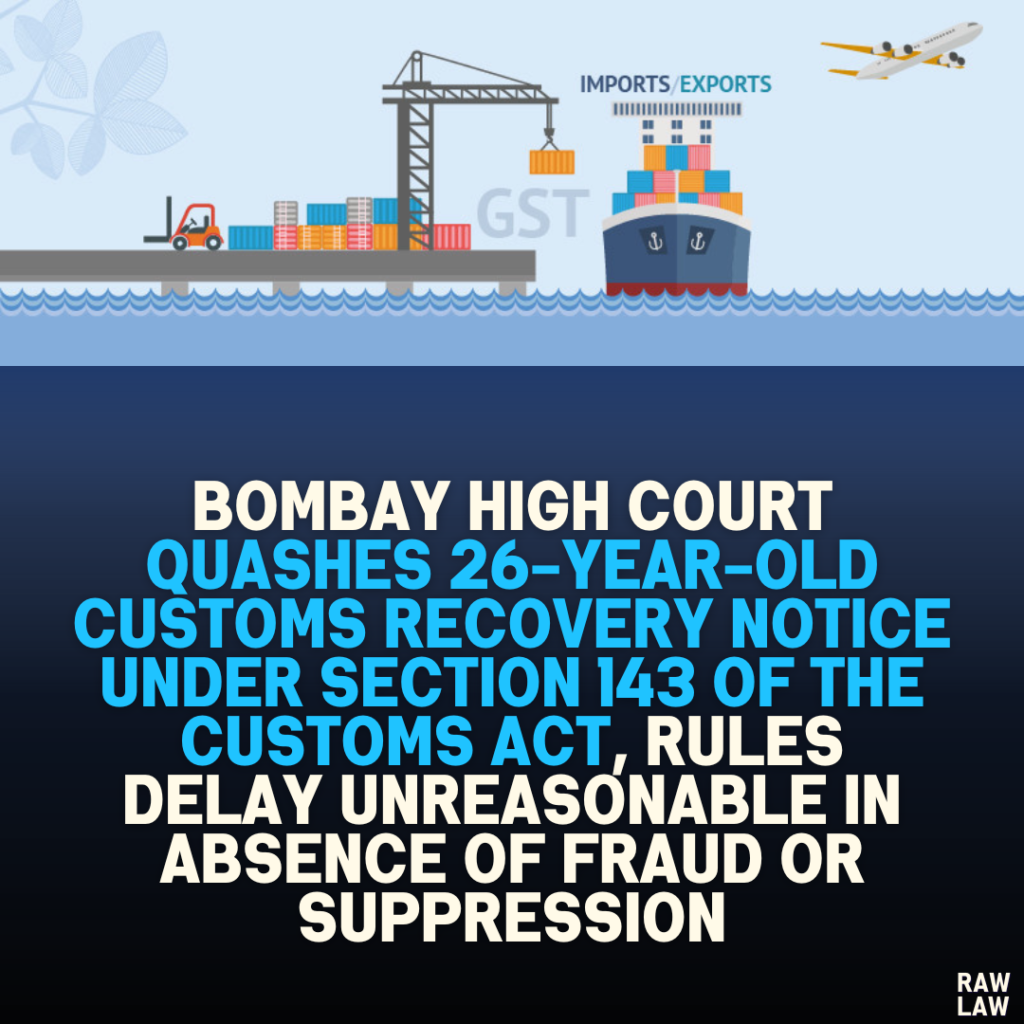Court’s Decision:
The Bombay High Court quashed the recovery notice issued under Section 143 of the Customs Act, 1962, against Mahindra and Mahindra Ltd., ruling that initiating proceedings after a delay of 26 years was unreasonable and unjustified. The Court emphasized that, even in the absence of a specific statutory time limit, actions must be taken within a reasonable period, guided by analogous provisions in the Act.
Facts:
- Notice Details:
- On December 15, 2022, a notice was issued to Mahindra and Mahindra Ltd. for non-submission of the Export Obligation Discharge Certificate related to an Advance Authorization dated September 23, 1996.
- Nature of the Recovery:
- The notice sought to recover duty foregone under the Customs Act for the failure to fulfill export obligations tied to the authorization.
- Petitioner’s Challenge:
- The petitioner argued that the recovery notice was issued after an inordinate delay of 26 years, rendering the proceedings grossly unreasonable.
Issues:
- Whether the recovery proceedings initiated after 26 years were barred by unreasonable delay.
- Whether Section 143 of the Customs Act permits recovery actions without a specific time limit.
Petitioner’s Arguments:
- Unreasonable Delay:
- The petitioner contended that the 26-year delay in issuing the notice was unjustified and violated principles of reasonableness.
- Cited Union of India vs. Citi Bank (2022), where the Supreme Court quashed proceedings initiated after a decade, as a precedent.
- Guidance from Section 28 of the Customs Act:
- Highlighted that Section 28, which governs recovery in cases of fraud or suppression, prescribes a 5-year time limit, suggesting that 26 years was excessive in the absence of such allegations.
Respondent’s Arguments:
- No Statutory Time Limit:
- Argued that Section 143 of the Customs Act does not prescribe any time limit for initiating recovery proceedings.
- Validity of Notice:
- Maintained that the proceedings were valid under the broad powers granted by Section 143 of the Act.
Analysis of the Law:
- Reasonable Period Doctrine:
- The Court observed that in the absence of a statutory time limit, actions under the Customs Act must be initiated within a reasonable period.
- It noted that a delay of 26 years could not be deemed reasonable, particularly in the absence of allegations of fraud or suppression.
- Guidance from Analogous Provisions:
- Referenced Section 28 of the Customs Act, which prescribes a 5-year time limit for recovery in cases of fraud, as a benchmark for determining reasonableness.
- Precedents Supporting Delay as a Ground for Quashing:
- The Court relied on Union of India vs. Citi Bank and Coventry Estates Pvt. Ltd. vs. Joint Commissioner, CGST & Central Excise, which quashed proceedings initiated after inordinate delays.
Court’s Reasoning:
- Unexplained Delay:
- The respondents failed to justify the delay of 26 years in initiating the recovery proceedings.
- Held that the notice violated the principle of reasonableness inherent in administrative actions.
- Lack of Fraud or Suppression:
- The Court noted the absence of any allegations of fraud or suppression, further weakening the justification for the delay.
Conclusion:
The Bombay High Court quashed the recovery notice issued on December 15, 2022, against Mahindra and Mahindra Ltd., ruling it barred by unreasonable delay. The Court reiterated the need for prompt action in administrative matters to uphold fairness and certainty in legal proceedings.
